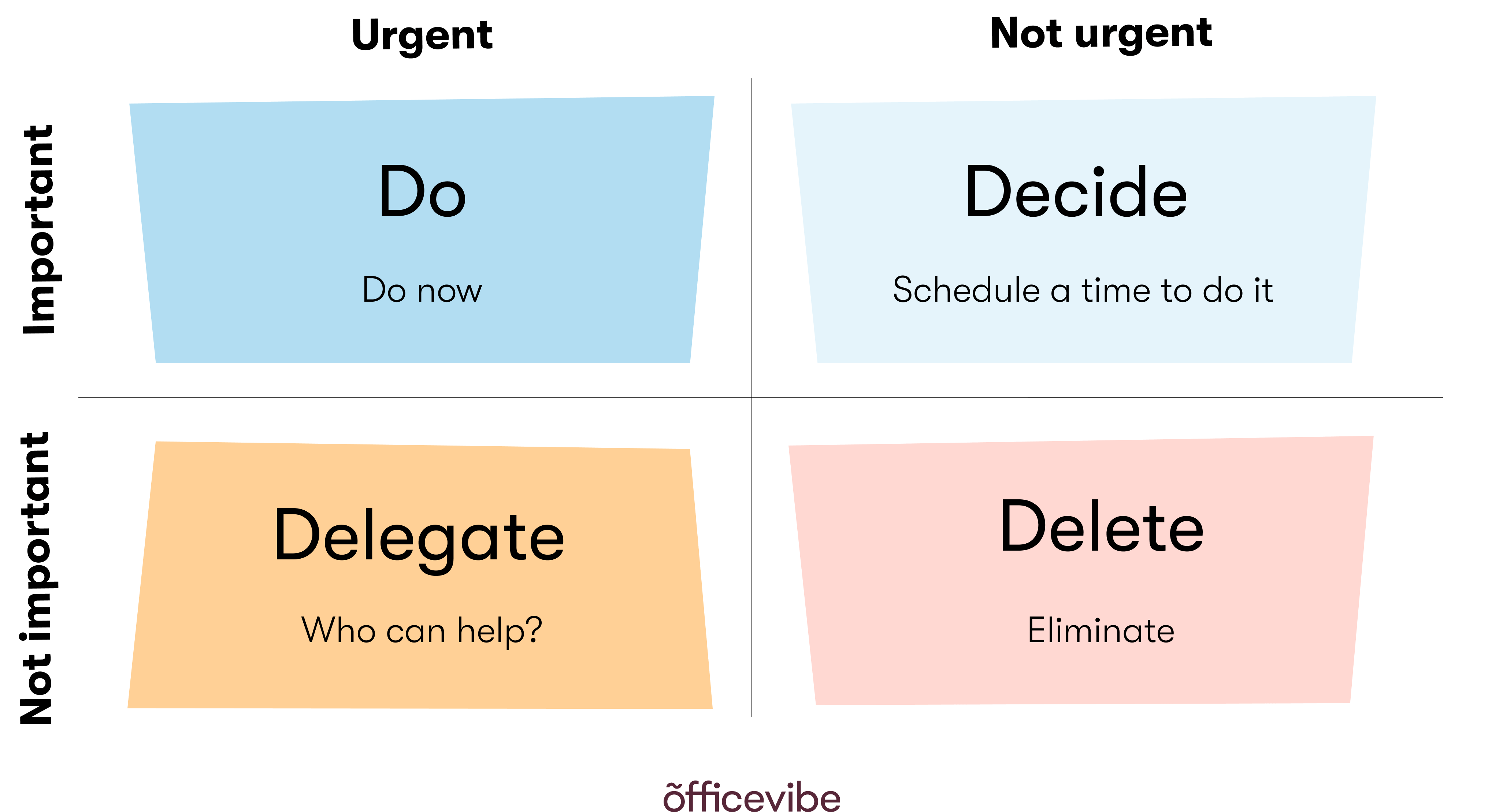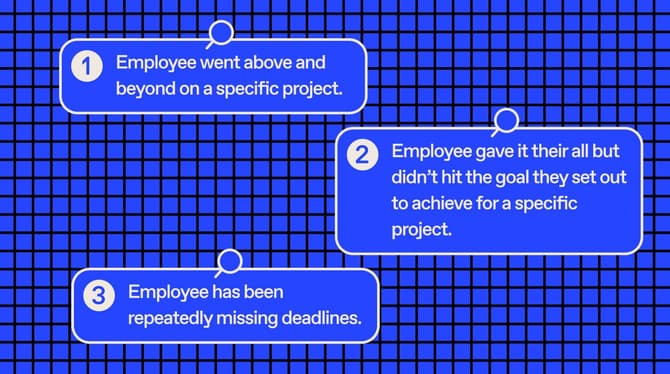Have you ever finished a full day of work only to feel like you haven't accomplished anything important? Many managers, whether seasoned or newly minted, often qualify themselves as busy, but not always productive. While it's no surprise that being busy is par for the course when you’re a manager, being busy doesn't always mean you’re being effective with your time. In fact, it can be an indicator of just the opposite.
The best managers know that the secret weapon to get out of this cycle of busyness is to hone their delegation skills.
When you learn how to delegate work effectively, it lets you focus on the most important parts of your job, while removing low-impact work from your plate. Plus, it can help employees work on new projects, learn new skills, and stay engaged.
If you find yourself struggling to prioritize your high-impact work, consider intentionally delegating more tasks to people on your team.
Exclusive online summit
·
May 23 2024
Moments that matter: how to seed great work
In this article, you'll learn
Why delegations skills are critical for managers
As a manager, your role is to help prioritize, steer, and drive work that will generate the highest value for your team and company. If you’re stuck running reports and managing the day-to-day minutia, you won't be able to take the high-level view you need to strategize and make decisions. Beyond creating space to focus on high-impact work, delegating tasks provides great learning and development opportunity for your team, and for you.
For example: you may be able to quickly and easily outline a marketing campaign. But while this kind of task may be important, it might be the kind of thing that would be better for your team to take on. If an employee has never taken the lead on this kind of project, handing this task off will allow them the opportunity to flex new skills.
30% of employees don’t feel like they have someone who contributes to their growth and development.
Officevibe's Pulse Survey data
By delegating work, you can contribute to your employees' ongoing growth and development. This will keep employees engaged, which comes with a host of benefits for your team. Plus, you clear up time on your calendar to focus on your own personal and professional development.
Are you afraid to delegate? You’re not alone!
Why is it so hard to delegate sometimes? We asked this question to some managers in our network. While many managers recognize the value in delegation, they can struggle when it comes to letting go of their work. Here are a few common reasons why:
1. Maintaining team focus
Most times I don’t delegate when the team is focused on other priorities and I'm not trying to distract them with today’s shiny objects. I also think available capacity and unknown skills can play a role with new team members.
Jon Gatrell, Principal Partner at Market-Driven Business
While the intention here is good, it's all about finding a balance. You don't want to distract your team, but if you never pass the ball, they might feel like you don't trust them or you're not willing to share the fun and exciting work. Giving people a chance (and the proper time to take it on) will build your team's trust in you as a manager and keep employees engaged,
2. More upfront work
Some managers just go ahead and do it themselves, because getting someone else up to speed takes more time than just completing the project. It's a bad practice in general, but that doesn't mean a manager can't do some creative work at times. It's a balancing act.
Adam Morgan, Executive Creative Director at Adobe
Finding the time and clarity to give a proper brief and set the team up for success.
Melissa Wong, Brand Director at REX Marketing + Design
It’s definitely a case of needing to brief so detailed sometimes that it’s ten times quicker to just get it done. But this is for sure unhelpful when it’s taking you away from stuff you should be getting on with instead.
Nick Patterson, Production Director and Founder of Storm&Shelter
Delegating can feel difficult in the beginning as it may take someone else twice as long to get the task done as they ramp up. This is, however, is short-term thinking and will cost you more time in the long run. Your employees won't build up their skill sets, and you'll continue struggling to keep up with a never-ending to-do list.
3. They don’t want to let go of power
For us it’s all just been that my co-founder and I can be control freaks. Once we give up that control, we rarely, if ever, have regrets. Delegate, delegate, delegate! It’s almost always the right decision. After all, it’s why you hire people in the first place.
Jon Franko, Co-founder of Gorilla 76
When we have control, it reduces our uncertainty and our brain craves this. Our brains treat uncertainty as a threat, so when we have control we reduce our perceived threat. Simple. The best ways to alleviate this is to learn your team's skills, build up interpersonal trust, and support them taking on the responsibilities. Then you retain a sense of control without having to do the work yourself. Better teams. Better times.
Andy Longley, Performance Psychologist and CEO at teamup.inc
This might also boil down to a manager's lack of trust in their team. Or, they could worry that if they hand over their work to others, they may be seen as redundant. However, the best managers know the team’s success is their success and don’t feel threatened when helping others shine.
4. They don’t know how
Some managers may have simply never delegated and don’t know how to do it. When you're the manager, you may feel pressure to know how to do everything and have all the answers. It can feel intimidating to exercise a new skill like delegation. The great news is you’ve probably hired employees who are more qualified than you on certain tasks, so passing on work to them benefits the entire team.
How to know if a task is delegation material
If you’re not sure if a task is suitable for delegation, there are tools that can help you break it down.
Use the Eisenhower decision matrix
This priority quadrant method helps you reflect on what you can delegate. Based on the decision matrix, items that are urgent but not important can be delegated. This is a quick way to reduce your to-do list as a manager.

You also might consider items that are important and non-urgent as good opportunities for delegation. These types of tasks don't have the same time restrictions, but are still meaningful. So they can be a chance for employees to take on something new, with the time needed to learn.
Ask development questions in your 1-on-1s
Another great way to understand what to delegate is to look for opportunities in your 1-on-1 meetings with employees. Ask them what kind of work they would like to take on and plan ahead so they'll have the time to try new things. You can ask them questions like:
- Is there any work happening on the team that you’d like to be more involved with?
- Are there any tasks I currently work on that would be helpful for your growth to take on?
- What would a stretch opportunity within our team look like for you?
Based on their answers, you can look at your workload and see if there are any tasks that would match up with their interests and start delegating those.
Putting it to practice: How to delegate work effectively
You understand the importance of delegating work, and you're empowered with what can be delegated. Now, you're just wondering how to delegate work effectively, and what steps to take to redistribute some of your workload.
4 Steps to effective delegation
- Step 1: Decide who would benefit most. Thinking through your team, who would be most engaged or enjoy learning from this task? Who seems to have an interest in taking on more?
- Step 2: Make sure the person in mind has the bandwidth to take on additional work. You can do this through quick check-ins or 1-on-1 conversations.
- Step 3: Make sure you’re giving clear instructions on what needs to be done, what you expect, and where the person can go for resources and information they need to complete the task. Set clear timelines, and remove any roadblocks for them.
- Step 4: Follow up and be available to support them early on-whether this be through a demo of the work, or a collaborative working session.
By spending time on steps 3 and 4, you’ll reduce the likelihood that your employee misses the mark and ends up creating more work for you.
I believe, in the end, it comes down to how the manager wants to measure success and their own performance. For example, 'all tasks were done on time, as I would do them' is a different measure of success than 'all members of my team were able to take on new responsibilities, develop new skills, and gain autonomy.'
Richard Henri, Head of Lab at e180
While it may feel like more effort and work upfront, spending time early on helping your team develop the skills they need to take on new tasks will free up your time to become a more strategic business partner in the future.
Are there any tasks that you’ve been afraid to let go of? Try out these new skills today and let us know how it goes!
Equip HR and managers with tools to engage, recognize, and drive performance.




